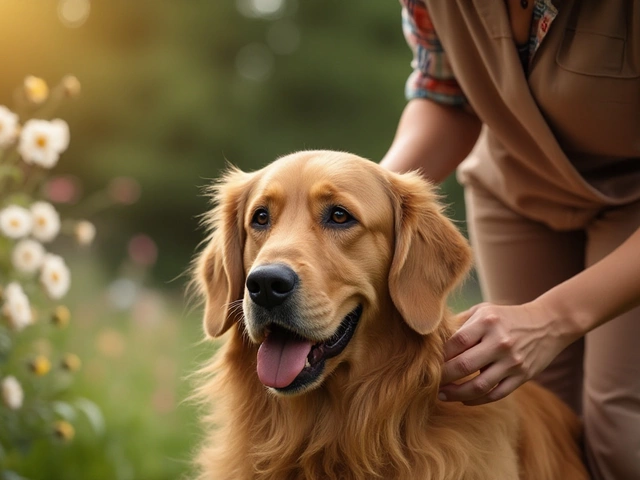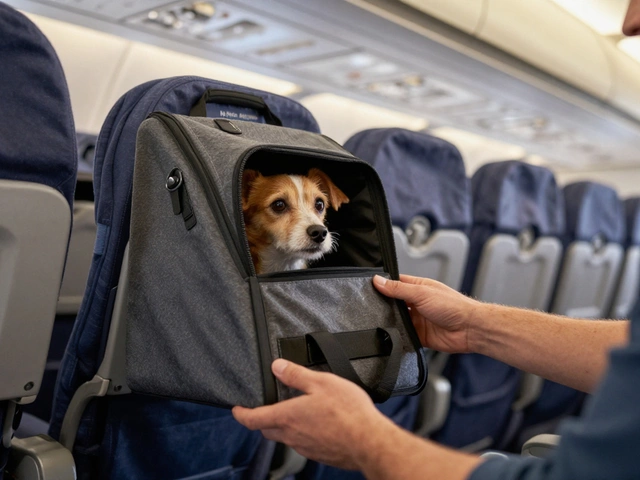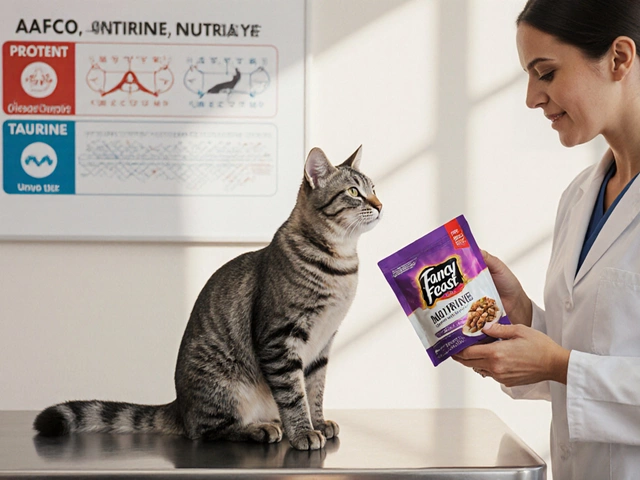Have you ever wondered why some dogs gleefully flop over and invite you to rub their bellies? While on the surface it might appear as a playful, cute gesture, there's much more happening beneath that fur.
When a dog rolls over for a belly rub, it's often seen as a sign of trust and submission. But this gesture could also reflect the dog's comfort level and general well-being.
Understanding the context of a dog's belly-up position can help dog owners foster healthier relationships with their pets. Making sure your dog's health is in check by incorporating the right supplements may also play a key role in this behavior. As we dig deeper into this seemingly adorable canine habit, we uncover the layers of understanding between human and dog. Let’s embark on this journey to truly understand what lies behind the belly rub request.
- The Meaning of Belly Rubs
- Trust and Comfort Indicators
- Health and Dietary Implications
- Enhancing the Bond with Supplements
The Meaning of Belly Rubs
When your furry companion nuzzles next to you and flips over, hoping for a gentle belly rub, it's not just an invitation for a cuddle. This action is rich in meaning and represents a complex part of canine behavior. Dogs, much like people, have individualized ways of expressing themselves, and a desire for a belly rub can often signal comfort and connection with their human. Some dog behaviorists suggest that exposing the vulnerable belly reflects a significant level of trust and attachment, echoing the social bonds found in pack dynamics.
In the wild, submissive behaviors like exposing the underbelly are essential for maintaining harmony among pack members. Dogs displaying this behavior towards humans are similarly projecting a non-threatening stance and recognizing their human's role as a caregiver or leader. It's fascinating to observe how domestication has maintained this nuanced language that canines exhibit—not just in family units among dogs but extending towards humans. Still, this show of submission isn't always the case; some dogs just enjoy the sheer pleasure of having their bellies rubbed.
Plenty of pet owners notice that their dogs often stretch like contortionists in search of that sweet spot. It's not only a sensation they savor but a moment to connect. By offering these belly rubs, you are engaging in a form of communication that strengthens your bonds. There is an element of unwritten dialogue occurring with each stroke, a way that dogs reassure their trust and affection. James Serpell, a renowned animal expert stated,
'Understanding your pet’s body language is key to a harmonious relationship, and recognizing what they communicate through actions like a belly rub can enrich our lives.'Enhancing this understanding could mean paying attention to subtle cues your dog gives, which might indicate their mood or even their health state.
Interestingly, dog breeds and individual temperaments play roles in how frequently a dog may seek out belly rubs. More relaxed and social breeds or those that have consistently experienced positive interactions with humans tend to be more likely to display this behavior freely. It’s crucial to respect a dog’s unique personality; what one dog may deem enjoyable could be anxiety-inducing for another. Consistent positive experiences reinforce a dog’s comfort with this gesture.
Yet, suppose your pooch suddenly resists a belly rub they once adored. In that case, it might be worth considering an underlying health issue or discomfort. Supplements tailored to canine health support might help improve overall well-being, encouraging those belly-up behaviors. By understanding the 'why' behind the belly rubs, owners can become more attuned to their pet's needs, ensuring that every belly rub is a reciprocal gesture of love and happiness.
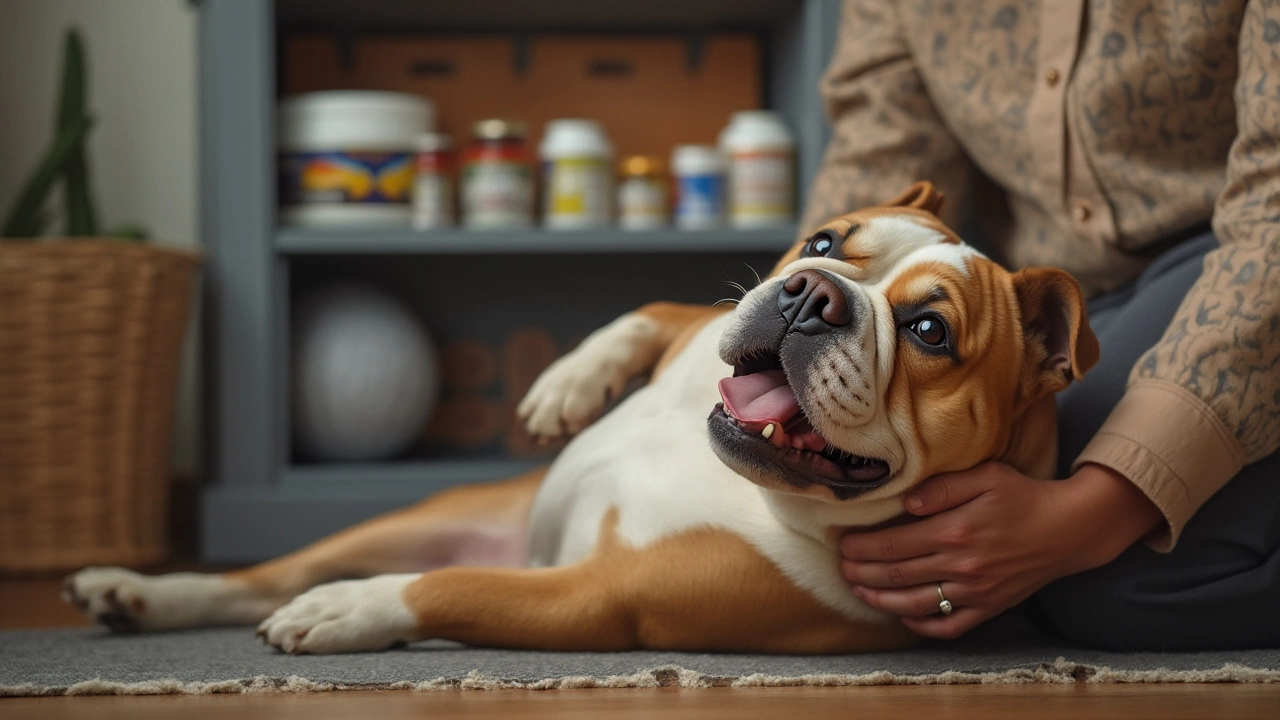
Trust and Comfort Indicators
Dogs, like humans, have their own unique ways of expressing emotions and feelings of safety. When a dog lets you rub his belly, it can be an indicator of trust and a profound level of comfort. This behavior often illustrates the dog's internal psychological state and their comfort with their human companion. Rolling over and presenting their vulnerable stomach is not something a dog would do with just anyone; it’s a signal that they feel safe in their surroundings. A dog's belly, seen as a sensitive area, is exposed only to those they deem non-threatening.
An interesting fact to note is that in the wild, exposing one's stomach is a posture of submission or deference among canines. In a household setting, while some dogs might still use this position as a submissive gesture, more often than not, it signifies a bond of trust. Dr. Stanley Coren, a psychologist and canine expert, says,
'A dog turning over is akin to a person leaning back in a chair – totally relaxed and ready to enjoy time with you.'Dogs are incredibly intuitive creatures. They often gauge a person's body language and energy, deciding who makes them feel secure. In that sense, when a dog offers their belly, they are openly demonstrating a connection with you.
To fully understand this behavior, it’s helpful to consider the dog's environment and past interactions. If a rescue dog rolls over for a belly rub, it may have taken considerable time and patience for them to reach that level of trust. On the contrary, a dog raised in a nurturing home might exhibit this behavior with more frequency, reflecting its upbringing and level of comfort with humans. Moreover, positive reinforcement with treats and praise when they allow belly rubs can reinforce the behavior, further boosting their feeling of security.
Recognizing Subtle Signals
Being attuned to our pets’ cues is essential. While a belly exposure often indicates comfort, it's crucial to observe other signals the dog might be giving off. Tail wagging, relaxed ears, and soft eye contact generally accompany this gesture. However, if the dog appears rigid, with a tucked tail or flattened ears, they might actually be feeling threatened and attempt to appease someone or something perceived as dominating. This nuances our understanding of the context of belly rubbing; it’s not always a pure sign of joy.
Canine body language experts suggest making observations over time to understand these subtle signals. It's more about reading the combination of signals rather than relying solely on a single gesture to draw conclusions about a dog's feelings. In the long run, paying attention to these communication signals can enhance the mutual understanding and trust between you and your dog. Keeping tabs on which situations evoke positive belly-up moments can also provide insights into what makes your dog comfortable. Thoughtful observation combined with affection and care can help ensure that these moments are indeed sincere expressions of comfort.
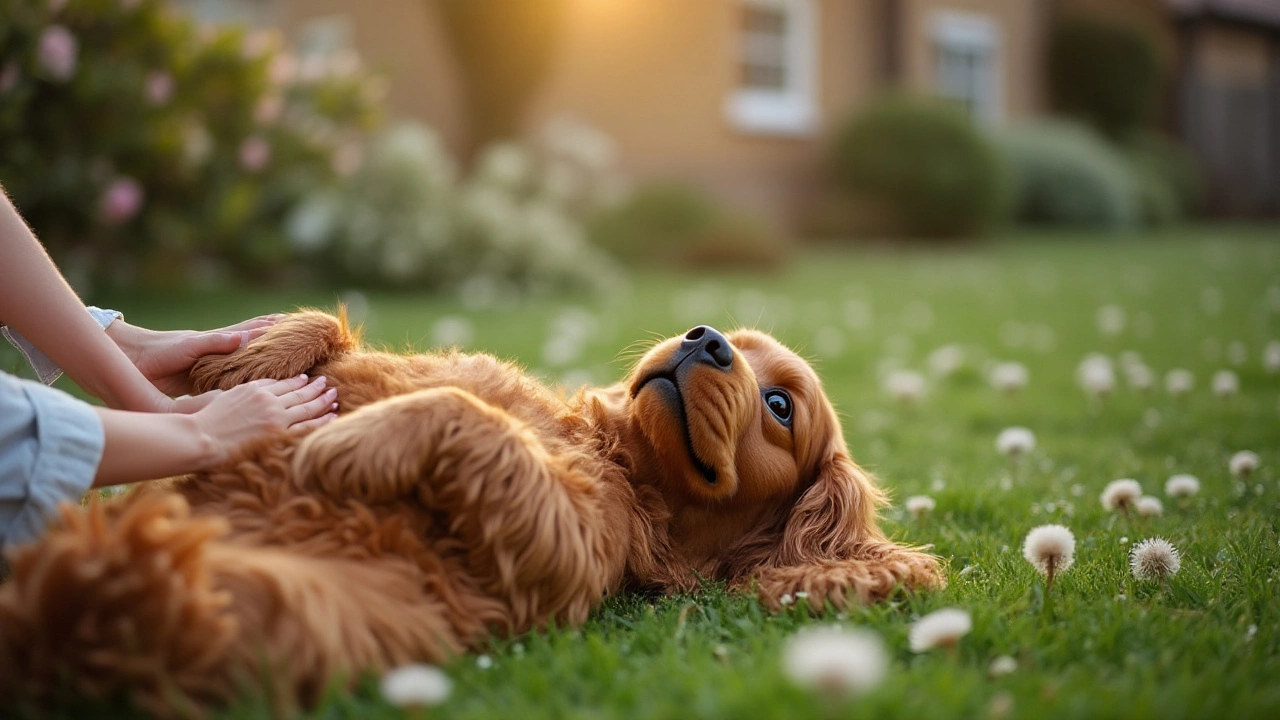
Health and Dietary Implications
When your furry friend displays a vulnerability such as exposing their belly, it can be a signal of their instinctive robustness or frailties, often linked subtly to their health and nutrition. A dog's diet plays a pivotal role in its behavior and comfort levels. When the belly-up position is easily offered, it may sometimes indicate that your dog feels physically comfortable and free of pain, an indirect endorsement of its current health status.
The dietary choices we make for our pets are echoed in various dog behavior patterns, including the decision to let humans rub their bellies. For instance, omega-3 fatty acids, often found in fish oils, are known to support joint health, allowing the dog to easily stretch its body into this position without distress. Balanced nutrition ensures strong muscles and healthy skin, reducing pain or discomfort that may otherwise deter this display of relaxation.
The Role of Healthy Gut
Furthermore, a well-balanced gut microbiome achieved through high-quality dog supplements can influence energy levels and mood. As Dr. Richard Thompson, a distinguished veterinarian, points out:"A happy dog often reflects well-adjusted internal health. Just as humans, dogs' outward dispositions can tell us volumes about their dietary needs."Imagine a diet lacking essential vitamins; it could lead to sluggishness and a lack of enthusiasm for play, including ignoring usual gestures such as belly exposure.
There's also the direct role that diet plays in anxiety and stress. Dogs plagued by chronic stress may shy away from belly rubs due to discomfort caused by nutritional deficiencies. Supplements specifically designed to address canine anxiety, such as those enriched with valerian root or chamomile, can promote calm and assurance in dogs, encouraging them to invite such intimate interactions with their humans.
Detecting Health Issues
Using a list of symptoms related to poor diet is critical for your pet's health. Some potential indicators include:- Dull coat or hair loss
- Frequent digestive problems
- Lethargy or significant decrease in activity
- Excessive thirst or hunger
If your dog, one who used to demand numerous belly rubs, suddenly retreats from this behavior, it might be time to evaluate their dietary regimen. A table can often help organize canine nutritional requirements:
| Nutrient | Importance |
|---|---|
| Protein | Muscle development and energy |
| Fatty Acids | Joint health and cognitive function |
| Fiber | Digestive health |
| Vitamins and Minerals | General well-being |
In light of these points, it’s evident that ensuring a balanced diet is integral not just for the physical health of a dog but also crucial in maintaining their behavior consistency such as allowing a simple, joyous belly rub. As guardians, our responsibility is ensuring that this cherished interaction comes with a tail-wagging affirmation of our pets' well-being.
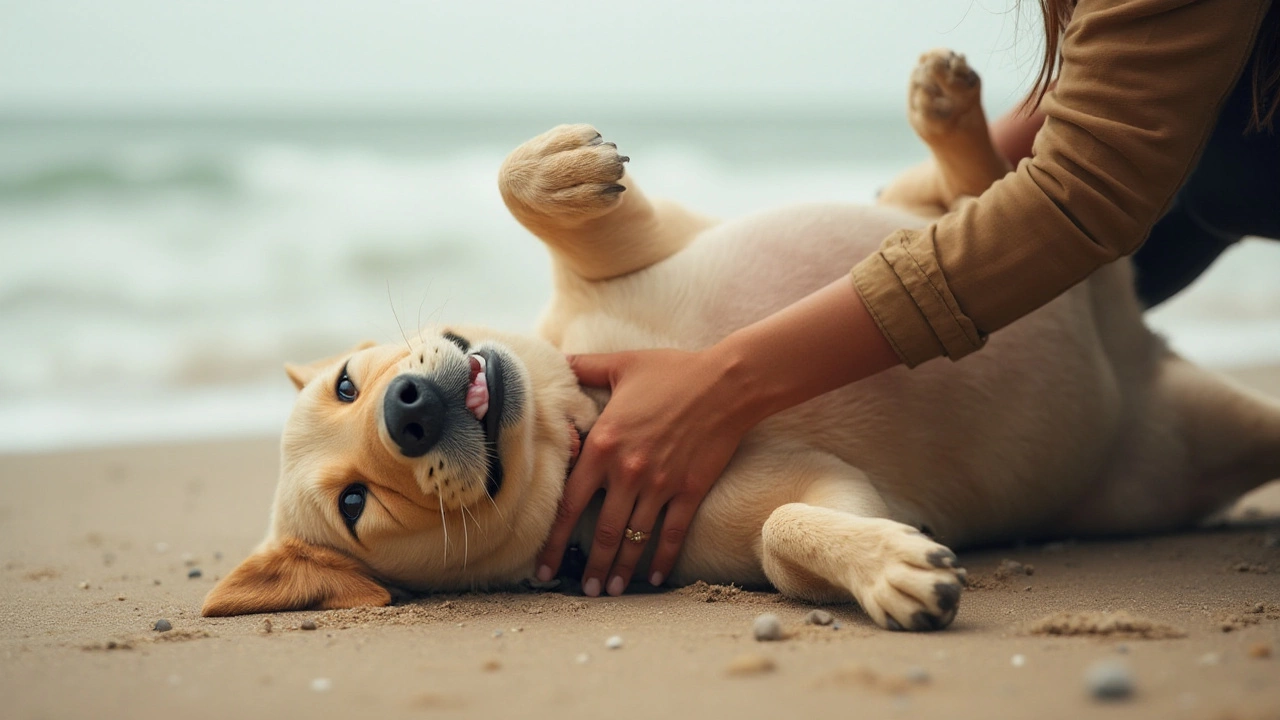
Enhancing the Bond with Supplements
Our canine companions have a unique way of communicating their needs and feelings, and understanding these signals can greatly strengthen the human-dog bond. One often overlooked avenue for enhancing this bond is through the use of appropriate health supplements. While many people associate supplements simply with nutritional support, they can also play a crucial role in maintaining a dog's health, which in turn can influence behavior. A healthy dog tends to be happier, more active, and more eager to engage, including showing that adorable belly-up gesture inviting interaction. By analyzing a dog's diet and integrating suitable supplements, pet owners can ensure their furry friends are receiving the required nutrients for not just physical, but behavioral well-being. This is where a better understanding of supplements becomes an integral part of a dog's life.
When talking about dietary supplements, it’s essential to consider what your specific dog needs based on age, activity level, and health. For instance, Omega-3 fatty acids, often found in fish oils, can be incredibly beneficial not just for coat health, but also for joint mobility and even cognitive function. A dog that feels physically comfortable is more likely to be at ease, making them naturally more affectionate and open to interactions like belly rubs. A well-supported diet is foundational in keeping a dog’s mood stable, which is vital for maintaining a trusting relationship. Many veterinarians suggest Omega-3 supplements as a staple dietary addition, particularly for older dogs who may begin to experience joint stiffness. This simple addition to their diet can greatly enhance comfort, promoting a willingness for those lazy, relaxed belly rub moments.
Probiotics are another category of canine health supplements worth considering. Good gut health is linked to improved digestion, nutrient absorption, and even stress reduction. A dog with an upset stomach or discomfort is unlikely to engage in social behaviors, showing the value of supporting the digestive system. Mood and demeanor can often be indicators of internal health; thus, a supplement that stabilizes digestive health can indirectly assure a more pleasant demeanor in dogs. Improving gut health can inadvertently make your dog more sociable, leading to more moments where they feel comfortable exposing their belly, symbolizing their trust in you.
"The inclusion of probiotics in a dog's diet has been shown to lead to a significant decrease in anxious behaviors," notes Dr. Sarah Huber, a renowned veterinarian specializing in canine nutrition. "This can naturally enhance the bond between pet and owner, as the dog feels more at ease."
The next important category is joint supplements, such as glucosamine and chondroitin. These are particularly significant for active dogs or those in their senior years. A dog experiencing joint pain will often show reluctance in engaging in activities that require movement. By addressing joint health proactively, through targeted supplements, you can help promote more physical comfort, encouraging a playful and relaxed disposition. This means your dog is more likely to flop down at your feet, belly exposed, signaling their readiness for a good rub. The enhanced physical comfort from reduced joint pain through supplements contributes to fewer aches and a happier pet.
| Supplement | Benefit |
|---|---|
| Omega-3 | Improves coat, joint health, and mood |
| Probiotics | Enhances digestion and reduces stress |
| Glucosamine | Supports joint comfort and mobility |
Finally, it’s crucial to remember that every dog is unique, with distinct needs based on breed, age, and existing health conditions. Therefore, consulting with a veterinarian before embarking on a supplement regimen is imperative. Understanding these individual requirements ensures that the chosen products are truly beneficial and not redundant or counteractive. The ultimate goal of incorporating dietary supplements is to improve a dog's quality of life, reflecting positively in their behavior and interactions. When a dog’s overall health is optimal, their natural inclination to form deeper bonds, often exhibited by laying belly-up in happiness and ease, will be evident.



